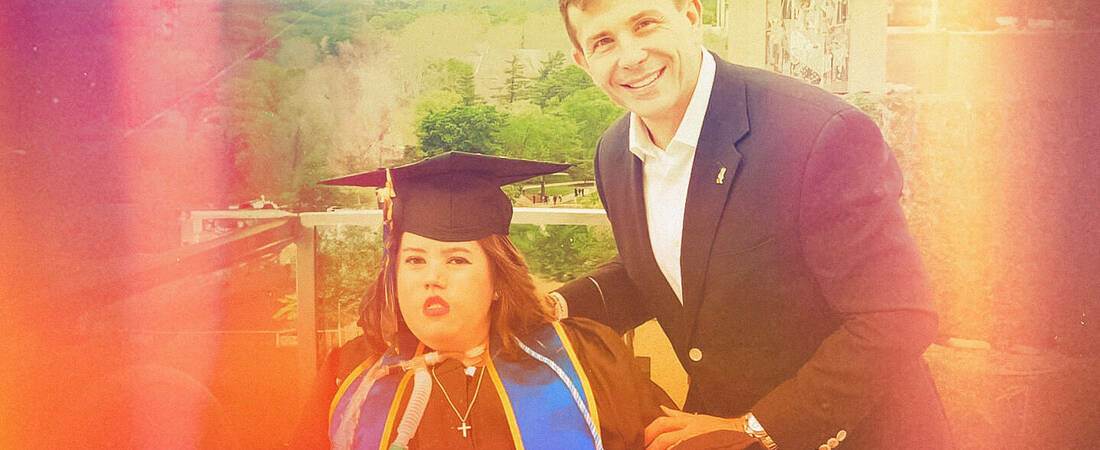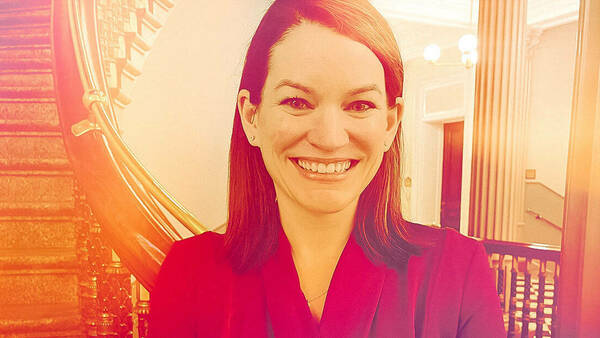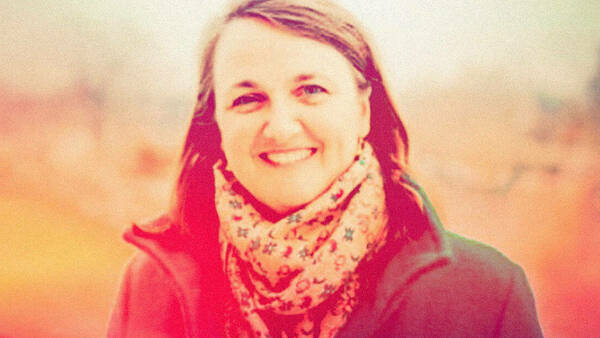Back in 2001, the Make-A-Wish Foundation sponsored a trip to Disney World for the Crowley family. Megan, their four-year-old daughter, and Patrick, their three-year-old son, were both suffering from Pompe disease, a rare form of muscular dystrophy that causes progressive weakness to the heart and skeletal muscles. They both needed wheelchairs and ventilators, and their father, John Crowley ’92 J.D., recalls it felt like “a race against time, and the clock was ticking.” Doctors had told the Crowleys that their two young children would likely only live to be a few years old.
Almost 20 years later, Megan ’19 is a college graduate and works for the Make-A-Wish Foundation of New Jersey. She’s making dreams come true for kids with critical illnesses, just like the foundation did for her. And it’s only possible because the grim diagnosis was not acceptable to her parents, John and his wife, Aileen. Instead, they were determined to find treatment and a cure for their children.
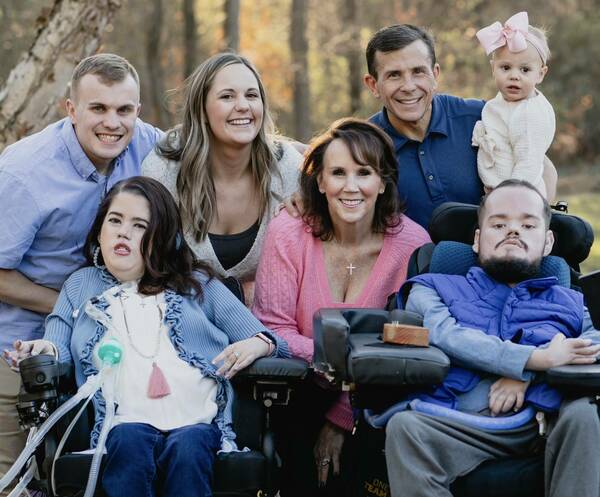
“We decided to go all in. There was a researcher who had an idea, brilliant, but very early, and he wanted to start a biotech company,” says Crowley, who was hired to be the company’s CEO.
His family was living in Princeton, New Jersey, but the company was based in Oklahoma City, so Crowley commuted to Oklahoma every Monday morning. He spent the week working there while Aileen cared for Megan, Patrick, and their older brother, John, who does not have Pompe disease, back home in Princeton. Then he’d travel home to be with his family on the weekends.
“We were making progress, but there were also never enough resources. We took a home equity loan on our house, cash advances on our credit cards,” Crowley says. “And then, ultimately, we sold that company to a much larger biotech company called Genzyme. And then, on January 9, 2003, the kids began to receive life-saving enzyme replacement therapy.”
Megan and Patrick had been given six months to live at the time. Both children had severely enlarged hearts due to Pompe disease. But after six weeks of the every other week enzyme replacement therapy, their hearts went back to normal size and normal function.
“It was a miracle drug on their heart. For a time, especially for our Megan, they got much, much stronger, for about a year,” Crowley says. “And then they plateaued and we knew we needed to make them stronger- we needed an even more potent medicine. Megan was in kindergarten, Patrick in pre-kindergarten, and we realized that this was not going to be a sprint. This was going to be a lifelong marathon.”
Crowley, a Navy combat veteran and a lawyer by training who graduated from Notre Dame Law School in 1992 and also has a Harvard MBA, focused all his efforts on biotechnology entrepreneurship to find treatments for rare genetic diseases. After building the company that made that initial breakthrough in treating Pompe disease, he served as founder and CEO of Amicus Therapeutics, a now global biotech company with more than 600 employees. As he pushed for advances to treat the disease, he also made sure his own children received treatment.

His family’s story was chronicled on screen in the 2010 film Extraordinary Measures, which starred Academy Award-winner Harrison Ford, as well as in a series of articles in The Wall Street Journal. The attention was unexpected, Crowley recalls: “We started to get calls from Hollywood agents, including a call from Harrison Ford. My dad was a cop growing up in northern New Jersey — Hollywood stars didn’t call the house. I actually hung up on Harrison Ford, because I thought it was a joke at first.”
WSJ reporter Geeta Anand started profiling the Crowley family in 2001, and later wrote The Cure: How a Father Raised $100 Million — And Bucked the Medical Establishment — In a Quest to Save His Children, the book upon which the movie was eventually based. Crowley has also published his own memoir, Chasing Miracles: The Crowley Family Journey of Strength, Hope, and Joy.
“For us, it began by highlighting the problem, our very personal problem with our children, that I had no idea how to solve,” Crowley says. “As we met other families with Pompe, other families with the now more than 10,000 known rare diseases affecting more than 500 million people in the world, I realized how vast this problem is and that we are not alone. And that taken together is not a rare problem. It’s actually a very common problem. For me, it was important to tell that story. And then as we had some measure of success, to share that and tell people that you can have hope, and that hope can be translated into something like a life-saving medicine.”
Not only was Megan’s life saved by the treatments developed at the companies her father oversaw, but she has been living that life to the fullest. She was determined to go to college, even undergoing a risky surgery to straighten her spine that enabled her to sit upright in her wheelchair. She arrived at Notre Dame in the fall of 2015.
On campus, Megan lived in Ryan Hall, volunteered with the Make-A-Wish Foundation, and studied film, television, and theater and American studies. She was supported by a 24-hour team of nurses, as well as dorm friends who volunteered to help when she needed assistance transferring from her wheelchair to her bed. She uses a ventilator, and the muscle weakness in her jaw and throat require a permanent feeding tube. Even with these challenges, Megan went to classes, Masses, games, and parties with her peers—the complete Notre Dame experience.
“Being a Notre Dame student was such a powerful experience in learning, living, faith, and love,” Megan shares.
After graduating from Notre Dame in 2019, Megan earned a master’s degree in social work and started working for Make-A-Wish in her home state of New Jersey, as the assistant director of mission integration.
“It is so rewarding being able to give back and to have Make-A-Wish in my life every day,” she says. “Once Make-A-Wish comes into your life — and your heart — it never leaves. It’s such a special team and mission that I am blessed to be a part of.”
After years of her dad fighting for her health and well-being, Megan is now doing the same for others with rare and critical illnesses. She recently wrote an article for the website RealClearPolicy, advocating for life and for people with disabilities.
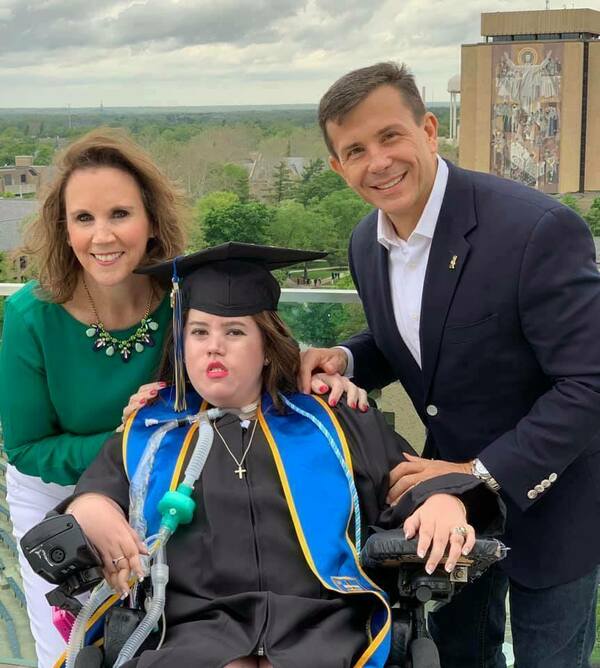
“The mark of a great society is what it does to protect the weakest and most vulnerable among us. ...We deserve a chance. We are part of the richness of a truly diverse and inclusive society. Our lives are worthy of birth, and worthy of living," Megan says.
As Megan’s career in advocacy and nonprofit work takes off, John Crowley is continuing his efforts to fight rare diseases. In March, he took over as the president and CEO of the Biotechnology Innovation Organization (BIO), the world’s largest biotechnology advocacy organization based in Washington, DC.
Their shared work on behalf of others is rooted in their shared alma mater. “Notre Dame has forever shaped my view of the world and my role in it,” Megan says. “It was the greatest gift I could have ever received. I only hope I can continue to live a life worthy of that gift.”
John emphasizes his gratitude for the Notre Dame family: “The Notre Dame family has been part of our journey every step along the way, from the day of our children’s diagnosis to our entry into this whole world of biomedical research, of which I knew nothing about. Now, as we look forward to my new position and helping to shape this environment, I’ll always carry forward the academic learnings from Notre Dame. But importantly, also the lessons of ethical leadership and of faith formation, that make life a full journey for so many of us. That’s been an incredible part of the foundation for everything that we’ve done.”
